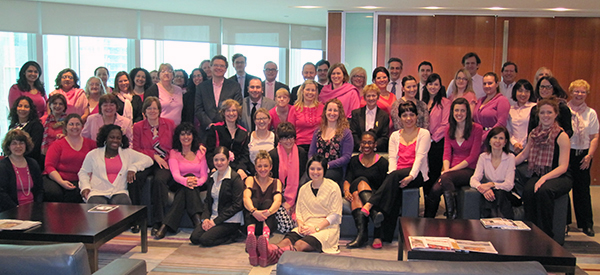Bay Street law firms are (finally) jumping on the diversity bandwagon.

Sixteen firms announced today they have joined forces to form the Law Firm Diversity and Inclusion Network in an effort to promote these values within the legal profession.
This follows the establishment of the
Legal Leaders for Diversity in June 2011, which is an organization of in-house counsel that promotes diversity within the legal departments of corporations across Canada.
Douglas New, a partner at Fasken Martineau DuMoulin LLP in Toronto and co-chairman of the firm’s diversity committee, says LLD has been very active in encouraging major law firms to join their initiative.
“Once we started to meet, we realized that each of the firms is doing some of the same things, some of the firms are doing different things, and there’s a lot to benefit diversity and inclusiveness [at] both the law firms and the community in which we serve by sharing some best practices between the firms,” he says.
The signatories of the network include: Faskens, Norton Rose, Bennett Jones LLP, McMillan LLP, Blake Cassels & Graydon LLP, Goodmans LLP, Borden Ladner Gervais LLP, Gowling Lafleur Henderson LLP, Osler Hoskin & Harcourt LLP, Davies Ward Phillips & Vineberg LLP, Heenan Blaikie LLP, Stikeman Elliott LLP, Dentons Canada LLP, McCarthy Tétrault LLP, Torys LLP, and WeirFoulds LLP.
“All of these law firms have their own initiatives going on internally and so this is a way that we can all share best practices and do things more uniformly,” says Andrea Raso Amer, a partner at Dentons Canada LLP in Vancouver and co-chairwoman of the firm’s diversity committee.
“[And] to make it clear not only to the legal community but also to the community at large that diversity and inclusion is something that law firms don’t just give lip service to, it is really something that we want do and improve upon.”
The network’s core values include:
- Sharing ideas for the promotion of diversity and inclusion in connection with recruitment, retention, and advancement within law firms.
- Working with Legal Leaders for Diversity and other general counsel, law departments, business leaders, and professional associations in their efforts to advance diversity and inclusion.
- Supporting outreach programs in law schools and the broader community.
- Promoting thought leadership and constructive dialogue on issues of diversity and inclusion.
- Evaluating our efforts.
The last point has been a bit of a stickler as not all firms currently track their demographics.
“It’s not good enough to say we have X number of people of this background within our firm,” says Raso Amer. “It’s do they feel included? Do they feel that they have a road to progression? Do they feel that they have the opportunities that everybody else has?”
Dentons, formerly Fraser Milner Casgrain LLP, was the first firm to voluntarily gather metrics about its personell makeup when it conducted its first firm-wide survey in November 2008, which included a portion on self-identification in various equity-seeking groups.
“It was a way of measuring to some extent how we were doing internally,” says Raso Amer, adding working groups were developed as a way to address certain issues that arose as a result of the survey. Dentons conducted a second survey last year.
Douglas Rienzo, a partner at Osler and chairman of its diversity committee, says the firm conducted its first survey last fall to establish a benchmark.
"You can look around and say, ‘Well gee, I think we look pretty diverse,’ but until you actually go out and measure you really can’t say for sure,” he says.
New is of the same mind. “In order to know whether the programs you put in place are working, you have to know where you started,” he says.
Not all 16 firms have conducted surveys to gather diversity statistics, but most said they’re open to the idea.
They say not only will diversity initiatives benefit the firms, but clients as well.
“We try to represent the communities in which we operate,” says Troy Ungerman, a partner at Norton Rose and a member of its Canadian diversity commitee. “So if we have clients that are looking to do business in other jurisdictions, for instance, the extent to which we have a workforce that represents that community can be helpful from a business perspective for the client; it may make negotiations easier, it may make dealing with political or cultural sensitivities a little easier as well.”
“The more diverse we are, then the more understanding we’ll have of various cultures where [our clients] are doing business,” adds Rienzo.

 Sixteen firms announced today they have joined forces to form the Law Firm Diversity and Inclusion Network in an effort to promote these values within the legal profession.
Sixteen firms announced today they have joined forces to form the Law Firm Diversity and Inclusion Network in an effort to promote these values within the legal profession.